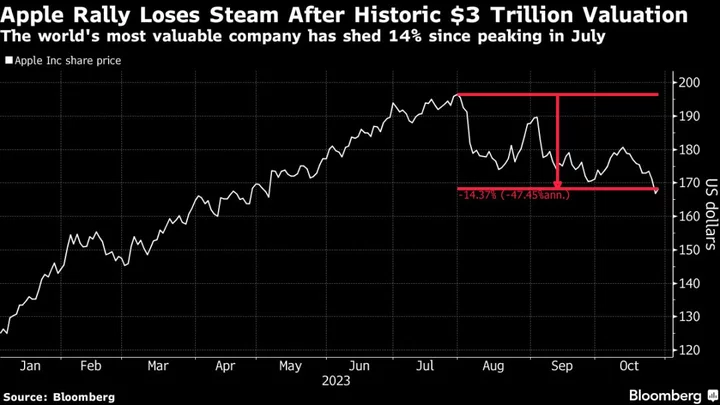A Federal Reserve meeting typically is the stock-market story of the week. Not so this time, however, as investors are more focused on Apple Inc.’s Thursday earnings report than the central bank’s Wednesday interest-rate decision.
There’s reason for concern about Apple. The world’s most valuable company, representing 7.2% of the S&P 500 Index, is facing a slump in smartphone sales, and one of its main suppliers is under investigation in China. A revenue decline is expected for a fourth consecutive quarter, its longest streak in more than two decades.
Other big tech companies have seen their shares drop after posting solid earnings this month, so investors may not be forgiving if Apple shows weakness. The stock is already struggling, on pace for a third-straight losing month, which hasn’t happened since the middle of last year’s selloff. The latest rout has erased about $460 billion in market value from a company previously worth about $3 trillion.
“If the earnings quality deteriorates for Big Tech companies — which has been a big factor in supporting stocks this year — then that gives the stock bulls one less branch to cling onto,” Ed Clissold, chief US strategist at Ned Davis Research, said in an interview.
Apple is big enough on its own to influence S&P 500 returns, but it can also ripple out to other stocks. The market is shaky, with the S&P 500 and Nasdaq 100 Index having shed about 10% from their July peaks. Earnings reports from the so-called Magnificent Seven technology companies — Alphabet Inc., Amazon.com Inc., Apple, Meta Platforms Inc., Microsoft Corp., Nvidia Corp. and Tesla Inc. — drove the declines after powering the surge in stocks through July.
Of course, the Fed’s decision is still big news. While traders broadly expect the central bank to hold rates steady, they’ll be listening carefully to what Chair Jerome Powell says at his press conference afterward, looking for hints on the path forward and the economic outlook.
Other big events are also on the calendar in the coming days. Just hours before the Wednesday rates decision, the US Treasury will announce plans for selling bonds and notes to refinance the government’s maturing debt, known as refunding. Another ramp up in sales could send yields soaring again and renew pressure on growth stocks, whose present value of future profits are worth less as rates rise.
But tech earnings have played an outsized role in share price movements recently, generally for the worse. Three of the five biggest technology-related companies to report so far have fallen the day after results.
Tesla’s stock tumbled more than 9% on Oct. 19, the day after the electric-vehicle maker missed profit and sales estimates. Chief Executive Officer Elon Musk dialed back growth expectations amid slumping demand and rising interest rates. Shares of Google-owner Alphabet sank nearly 10% on Oct. 25, a day after the company posted a smaller-than-expected profit in its cloud-services business that management blamed on customers reining in budgets.
However, Amazon.com and Microsoft both rallied in the wake of their earnings, which were both fueled by strong results in their cloud-computing businesses.
For investors, the problem is that the biggest tech companies have been responsible for the bulk of the S&P 500’s gains this year, helping to offset weakness in real estate, financial and health care stocks. So bulls have to figure out where gains will come from if Big Tech stocks keep sputtering.
The thing is, beyond Tesla the biggest tech companies haven’t really reported bad earnings. Take Alphabet. The search giant is seeing a recovery in the digital-advertising business that dominates its revenue, fueling better-than-expected profit and sales. Or Meta, which beat profit and revenue estimates, but the stock still fell after Chief Financial Officer Susan Li’s comments about economic uncertainty on the company’s earnings call.
The jittery reactions are a sign that after this year’s runup, stocks are priced for perfection, making any whiff of weakness a cause to sell, according to Eric Beiley, executive managing director of wealth management at Steward Partners Global Advisory.
“I’m concerned about the risk of higher-for-longer rates, which has put a ceiling on investing in Big Tech because there are fears that bigger stock declines are coming,” he said. Beiley used the latest pullback to buy shares of Amazon.com but is still waiting for Apple’s and Alphabet’s multiples drop further.
Going into earnings season, the Nasdaq 100 was trading around 24 times projected profits, above the average of 21 times over the past decade. Five of the seven biggest tech companies were priced above 28.
“Clients feel their losses more than they appreciate their gains,” explained Dana D’Auria, co-CIO at Envestnet Inc. “But if concern grows in the stock market, then Big Tech can still inevitably be a beneficiary since they’re known as risk-off, defensive play.”

